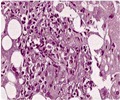Researchers show a new type of vaccine can reduce the incidence of pneumonia in children with and without human immunodeficiency virus (HIV).
Researchers show a new type of vaccine can reduce the incidence of pneumonia in children with and without human immunodeficiency virus (HIV).
Acute respiratory infections are a major cause of death in children under age 5. Additionally, pneumonia is becoming increasingly resistant to antibiotics. Doctors from around the world are in search of new methods to treat the illness. Researchers, conducted a study with nearly 40,000 children in South Africa. At 6 weeks, 10 weeks and 14 weeks of age, half of the children received the 9-valent pneumococcal polysaccharide vaccine. All of the children received the flu vaccine.The researchers found the pneumonia vaccine decreased the rate of the particular strain of pneumonia in the vaccine, by 72 percent. It also reduced the rate of confirmed cases by 17 percent. In an accompanying editorial, the authors write, “The decrease in these two outcomes were remarkably similar in both U.S. children and South African children. However, in South Africa about one third of the cases of invasive disease caused by serotypes included in the vaccine were associated with meningitis, a much higher proportion than in the United States.”
This vaccine, according to the study investigators, may be useful in countries where HIV infection is a significant cause of pneumonia. It also may reduce the risk of antibiotic resistance. However researchers noted an increase in asthma in those who received the vaccine, but that reason is not yet understood.











